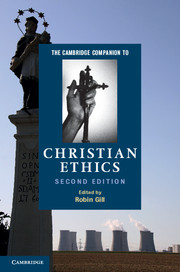Book contents
- Frontmatter
- Part I The grounds of Christian ethics
- Part II Approaches to Christian ethics
- 6 Natural law and Christian ethics
- 7 Virtue ethics
- 8 Gender and Christian ethics
- 9 Liberation ethics
- 10 Christian ethics in Asia
- 11 Christian ethics: a Jewish perspective
- 12 Other faiths and Christian ethics
- Part III Issues in Christian ethics
- Index
11 - Christian ethics: a Jewish perspective
from Part II - Approaches to Christian ethics
Published online by Cambridge University Press: 28 January 2012
- Frontmatter
- Part I The grounds of Christian ethics
- Part II Approaches to Christian ethics
- 6 Natural law and Christian ethics
- 7 Virtue ethics
- 8 Gender and Christian ethics
- 9 Liberation ethics
- 10 Christian ethics in Asia
- 11 Christian ethics: a Jewish perspective
- 12 Other faiths and Christian ethics
- Part III Issues in Christian ethics
- Index
Summary
I am a Jewish Christian ethicist. I realise that this professional self-description admits of multiple interpretations, so let me explain. Both my parents were Jewish and I was raised in a home steeped in Jewish values. At the same time, neither parent was particularly devout in terms of religious practice. Hence, the word ‘Jewish’ in my self-description should be understood in broad cultural rather than explicitly religious terms. At university I studied moral philosophy and Christian ethics, continuing both emphases in my graduate work. As a result, I probably know more about the ethics of Thomas Aquinas, Reinhold Niebuhr and Henry Sidgwick than I do about Solomon ibn Gabirol and Moses Maimonides.
Nevertheless, my Jewish background remains a permanent influence in my life. Over the years, it has led me back to issues or questions in Jewish ethics and has resulted in numerous publications in which I have tried to interpret Jewish ethics to a non-Jewish audience or apply Jewish ethical thinking to emergent issues in applied ethics. Although I certainly lack the intense formal training in Jewish thought and philosophy of some who are professionally identified as Jewish ethicists, I am perhaps better qualified than many of them to think about Christian ethics from a philosophically informed Jewish perspective.
In what follows I want to look at Christian ethics from a Jewish point of view. Specifically, I want to draw on my understanding of the Jewish tradition to compare and contrast these two traditions. My aim is to highlight some of the ways in which these two daughter traditions of biblical faith have come to differ over key features of the moral life. Of course, there are many important similarities between these religious-ethical traditions. Both believe that moral righteousness is an essential expression of faith in God. Both stress adherence to the most basic moral norms found in the Hebrew Bible. Reflecting their common debt to the Exodus traditions, both exhibit a special concern for the marginal and oppressed.
- Type
- Chapter
- Information
- The Cambridge Companion to Christian Ethics , pp. 145 - 161Publisher: Cambridge University PressPrint publication year: 2011

